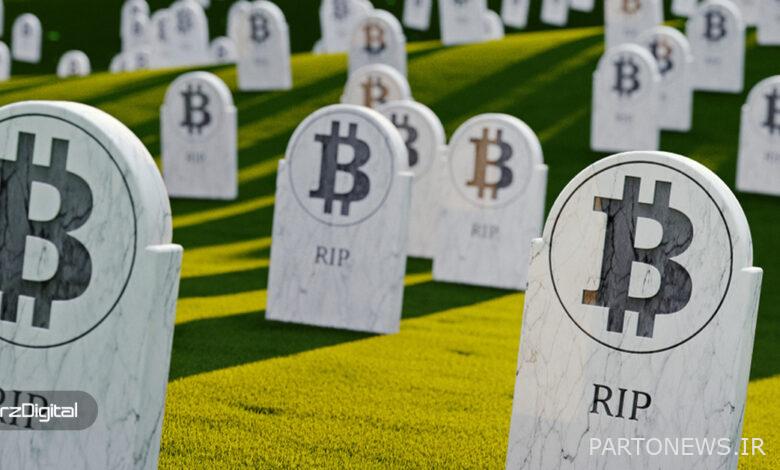Can the price of Bitcoin go to zero?

The sharp fall in the price of Bitcoin and reaching Zero On paper Possible but this is unlikely to happen in the near future. For example, you may think that if a very large amount of traders are liquidated, the price of Bitcoin will drop to zero, or if the Internet is cut off, Bitcoin will also be destroyed! So Can the price of Bitcoin go to zero? Yes, but not that simple!
Why should the price of Bitcoin go to zero?
The main reason people ask this question so often about Bitcoin is clearly the different nature of this asset from other things that people buy into an investment or use to transfer value. Unlike gold, Bitcoin is not tangible and has a digital nature, it does not have a concrete and clear backing like the shares of companies, it is not backed by a government like the US dollar, and people do not pay taxes or receive wages with it.
On paper, many things could happen to Bitcoin as an asset, system, or technology, causing its value to drop sharply or the digital currency to become worthless. Despite this, the number of scenarios that are taken seriously and regularly discussed are not many.
Reasons for Bitcoin price to zero
The threat of quantum computers
The threat that is raised about quantum computers is that the processing power of these systems will reach a level in the future that will allow breaking the encryption system of the Bitcoin network and guessing the private key of each wallet from its public address.
Each private key is one of 2 to the power of 256 possible states that a quantum computer must guess in such a scenario. To understand the magnitude of this number, it should be said that the total number of atoms in the world is probably less than that. Today’s computers are not able to guess this number either; Unless they have been processing continuously for several hundred years. Breaking Bitcoin encryption requires a quantum computer with 1.9 billion qubits of processing power. This number is very high; Especially when you consider that currently the best IBM quantum computers have only 127 qubits of processing power.
On the other hand, even if one day quantum computers become so powerful, updating and strengthening the Bitcoin network against such attacks is always one of the options on the developers’ table. In addition, it should be noted that when the threat of quantum computers becomes serious, it is not only Bitcoin that is at risk, and almost all banking systems, important systems and private information of active users online will face a serious risk.
Obsolete technology and declining public acceptance
The mainstream media regularly updates the list of technologies that may become obsolete in the near future. There are also some old technologies that are now practically obsolete and replaced by new technologies. For example, the use of CD or DVD was very booming in the 90s and 2000s. However, with the increasing level of Internet access around the world, this technology fell by the wayside and has not been used seriously in recent years.
It is true that Bitcoin and Blockchain are still emerging and evolving technologies, but it is not impossible for this technology to become obsolete. It is possible that in the not-so-near future, blockchain networks will be replaced by a new and more powerful technology, or even in the space of blockchain and digital currencies, other projects will appear and marginalize Bitcoin in some way.
In this hypothetical situation, which is very unlikely to happen in the near future, the price of Bitcoin will be directly affected. The value of this digital currency is tied to its acceptance among people, and if one day the desire of people to buy Bitcoin and use this network experiences a very sharp decrease, its value will surely fall. However, Bitcoin’s value falling to zero or being completely worthless seems far-fetched right now.
Energy crisis in the world and stop mining
The stability and security of the Bitcoin network is completely tied to the activity of miners. Miners also naturally need electrical energy to keep their mining machines powered up. A hypothetical scenario that could lead to the shutdown of the Bitcoin network is the formation of a global energy crisis.
Assume a situation where due to the lack of fuel, especially fossil fuels such as natural gas, which are used to generate electrical energy in power plants, the price of electricity will increase sharply. In this critical situation, Bitcoin miners will probably not be the priority to receive electricity to continue their activities. Therefore, there is a possibility that the Bitcoin network will face serious challenges due to a sharp drop in the hash rate, and in the worst case, transaction processing will stop. A shutdown of the network will naturally make Bitcoin worthless.
The formation of the energy crisis in the world may seem like a scenario similar to science fiction movies, but the global efforts to replace fossil fuels with renewable energies during the past decades show that this risk has been taken seriously for a long time and people are working in this field.
Bitcoin ban by governments

A widespread ban on Bitcoin by governments around the world seems much more unlikely than it did in the early years of this digital currency. Legislators around the world have begun the process of legislating the space of digital currencies and have sometimes developed specific legal frameworks for this area, which generally shows that official institutions are not strongly opposed to this sector at the moment.
However, the decentralized nature of Bitcoin and its resistance to censorship worries some governments, and in the past it has been seen that a country like China has declared all transactions related to digital currencies illegal for its citizens; However, the impact of this ban on China’s digital currency industry is debatable.
As it was said, this scenario has received less attention in recent years, but in a hypothetical situation where governments decide to deal with Bitcoin directly and widely, the value of this digital currency may experience a sharp fall; However, due to the nature of this network, dealing with Bitcoin by governments seems to be a very difficult task from a technical point of view.
Liquidation and huge losses of traders
In the past, like March 2020 (March 2019), the Bitcoin market has witnessed the liquidation of a large amount of trading positions in digital currency exchanges. These liquidations occurred after a sharp price drop in a relatively short period of time, but eventually this downward trend was stopped and recovered with the support of investors who bought at the price floors.
Considering the $860 billion market value of Bitcoin and the large amount of Bitcoins that have been accumulated for years outside of trading platforms for long-term storage, the liquidation of active traders in exchanges alone cannot cause a very sharp fall in the price of this digital currency.
What happens if the price of Bitcoin goes to zero?
Although such an event seems very unlikely in the near future, if one day the price of Bitcoin goes to zero for any reason, we are faced with two scenarios: the price will recover again or Bitcoin will be forgotten forever.
In this hypothetical situation, the price of Bitcoin will recover if the general public starts using this digital currency again for some reason. Forgetting it forever is a scenario that shows that Bitcoin has completely lost its effectiveness in this hypothetical situation.
Conclusion
Factors such as a decrease in public acceptance of Bitcoin, the replacement of this network with newer technologies, and the formation of serious security threats related to quantum computers are among the scenarios that may face this digital currency with serious challenges and a sharp drop in price. However, none of the cases discussed in this article seem likely in the near future.

